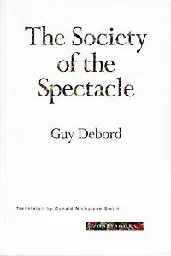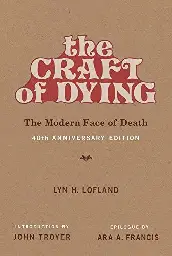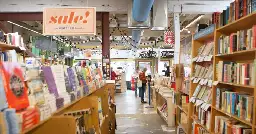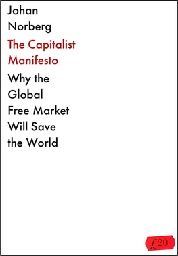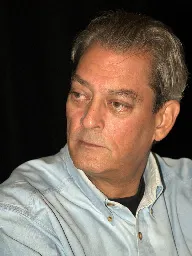Books
- What book(s) are you currently reading or listening? June 25
I was pretty busy last week, so couldn't post the weekly thread. Sorry about that.
Since the last update, I finished Cytonic by Brandon Sanderson, book 3 of the sci-fi series Cytoverse. After that, I continued with the last novella Evershore by Brandon and Janci Patterson. Now reading Defiant, the fourth and the final book in the series.
Also reading Design Patterns, a classic book for software design. While I have read about these online and studied from other sources, I never actually read the actual book. So fixing that now.
What about all of you? What have you been listening and reading lately?
----
A regular reminder about our Book Bingo, and it's Recommendation Post . Links are also present in our community sidebar.
- Book Review: From Hell by Alan Moore
The original post contains related links.
Food for thought for sure, From Hell is a complex piece of work with many layers of human emotions, expressions, and delusions.
One thing I particularly like about Alan Moore is his all-pervading kindness to everyone he presents in his works, both villains and heroes, victims and criminals.
So, we see Sir William Gull— a genius, a murderer, deranged to many but sure of his superiority only found his true nature of derangement and inferiority in his visit to a higher plain.
There are some memorable panels and monologues that will keep me thinking for quite a while.
Although Moore used Hinton's fourth dimension as a central concept of this work, he— probably with his modern sense of four-dimensional space understood the fourth dimension as time, whereas Hinton's was an Euclidean one. However, since the Euclidean dimensions are all spatial it may have helped Moore to think along the line where he can craft a simile like the panels above— where he compared the causality with architecture.
A masterpiece!
- Unshakable Wealth: The Power of Reading

Unshakable Wealth: The Power of Reading
!A young person reading a book in a modest room with minimal furnishings
Introduction
Wealth is often measured in terms of material possessions or financial assets, but there is a type of wealth that cannot be taken away: the wealth of knowledge. This wealth is accumulated through reading books, enriching the mind, and expanding one's horizons. Unlike material wealth, the knowledge gained from books grows over time and shapes one's character and outlook on life.
The Journey to Knowledge
From a young age, I began to understand the immense value of reading. Growing up in a modest environment, without the luxury of a personal library or the ability to purchase books, I still found ways to immerse myself in literature. Our family lived in a small, rented house, a single room shared by six people. Privacy was a luxury we couldn't afford, so I often hid outdoors to read in the fading daylight, escaping into the worlds within the pages. Initially, I read indiscriminately, but as I grew older, I became more selective, delving into works that offered deeper insights and understanding.
Literature as a Mentor
Books became my mentors, offering wisdom and guidance. The works of Russian classical literature, particularly from the 19th century, played a significant role in my development. Ivan Turgenev's "First Love" and Fyodor Dostoevsky's "Crime and Punishment" were not just stories but windows into the human soul, teaching me about the complexities of life, the struggles between good and evil, and the depth of human emotion. These books were not mere entertainment; they were experiences that shaped my thinking and moral compass.
!An old bookshelf filled with classic literature books, some in Russian and Georgian
The Importance of Native Literature
While foreign literature is invaluable for broadening one's perspective, it's crucial to have a solid foundation in one's native literature. Russian literature, with its unparalleled depth and richness, stands out globally. Knowing and appreciating the literary heritage of one's own country fosters a deeper connection to one's roots and culture. The tales of Tolstoy and the humor of Chekhov taught me about my own people, our traditions, and our values. They instilled in me a sense of pride and belonging, a feeling of being part of a grand, ongoing narrative.
Reading as a Lifelong Companion
As we age, the spiritual richness that books provide becomes even more important. In solitude, the characters and stories from books become companions, offering endless opportunities for reflection and intellectual engagement. A broad literary horizon ensures that one is never alone in thought, always having something profound to contemplate. In my later years, I find solace in the words of Dickens and Hugo, their stories reminding me of the endless capacity for human resilience and compassion.
!An elderly person sitting alone, deeply engaged in reading a book
The Battle Against Cultural Degradation
In today's world, there's a growing concern about the cultural degradation brought on by mindless entertainment and the overuse of foreign terminologies. Maintaining the purity of one's language is essential as language is a core component of cultural identity. The infiltration of unnecessary foreign words dilutes this purity and, by extension, the culture itself. Our language is a living testament to our history and values. It pains me to see it corrupted by needless jargon when there are perfectly good native terms. Language, much like literature, should be preserved and cherished.
A Personal Note
As a former comrade, born in 1930 and a participant in the Caribbean Crisis, I have witnessed firsthand the power of knowledge and culture in shaping our lives. The experiences from my military service during such a critical period in history underscored the importance of being well-informed and culturally grounded. These experiences, coupled with my love for reading, have fortified my belief that true wealth lies in knowledge and understanding.
Conclusion
In conclusion, the wealth of knowledge gained from reading is unshakable. It shapes individuals, enhances understanding, and enriches life in ways that material wealth cannot. Embracing both native and foreign literature, while preserving the integrity of one's language and culture, ensures a well-rounded and fulfilling intellectual life. Books are more than just pages and ink; they are a gateway to endless possibilities, a bridge to different worlds and eras, and a repository of human wisdom.
Call to Action
To cultivate this unshakable wealth, I encourage everyone to read more and explore the vast landscapes of literature. Start with the classics and expand your reading horizon. Join a book club, share your favorite reads with friends, and support local libraries. Together, let's foster a culture of lifelong learning and intellectual enrichment. In doing so, we not only enrich our own lives but also contribute to a more enlightened and understanding society. Let’s treasure the stories that connect us, the wisdom that guides us, and the knowledge that empowers us.
Question: Please share the last book that impressed you.
- Review: What is the Fourth Dimension? by Charles Howard Hinton
The version in my digital garden has richer formatting and related notes and highlights.
> The course of knowledge is like the flow of some mighty river, which, passing through the rich lowlands, gathers into itself the contributions from every valley. Such a river may well be joined by a mountain stream, which, passing with difficulty along the barren highlands, flings itself into the greater river down some precipitous descent, exhibiting at the moment of its union the spectacle of the utmost beauty of which the river system is capable. And such a stream is no inapt symbol of a line of mathematical thought, which, passing through difficult and abstract regions, sacrifices for the sake of its crystalline clearness the richness that comes to the more concrete studies. Such a course may end fruitlessly, for it may never join the main course of observation and experiment. But, if it gains its way to the great stream of knowledge, it affords at the moment of its union the spectacle of the greatest intellectual beauty, and adds somewhat of force and mysterious capability to the onward current.
If not anything else, this spirit (and the execution of it) is an excellent reason to write such a wonderful 32-page pamphlet with striking yet easily understandable ideas.
If you fail to find anything new in this book in regard to the fourth dimension, that is probably because this is one of those works that popularised those ideas.
As the name reveals, this book is a musing/speculation about the fourth dimension.
Hinton's four-dimensional space is an Euclidean one. This shouldn't be confused with the non-Euclidean four-dimensional space like the Minkowski's which was the basis of the Theory of Relativity. Hinton never mentioned time as the fourth dimension and it would've required a paradigm shift on Hinton's part. While it is not the spacetime we know now, it is quite an interesting system.
I liked how— example by example— Hinton built a system of fourth-dimensional space in a few pages which is consistent— complete with physical properties and consciousness, sound in its structure and extremely thought-provoking.
- Fiction with recursive loop
Is there any kind of fiction where multiple stories are connected in a recursive loop? The connection could be a character who writes or narrates the story. e.g.
- story A -> story B
- story B -> story C
- story C -> story A
Thanks in advance for any help!
- Book Review: The Society of the Spectacle by Guy Debord
The review in my digital garden also have a links for various related materials and notes and highlights I took while reading.
Guy Debord was not prophesizing. Quite the contrary. He observed these phenomena in his own time. Our feeling of eerie accuracy of describing our society is due to the fact that the disease is now more acute than ever.
There's no way to deny that symbolism leads the way to abstraction, and abstraction allows us to build broader logical systems. Most of our achievements as a species owes much to that. Money, or state, even most of the philosophies, and ethics are mostly make-believe. But, these are not imaginary either. These are inter-subjectively real.
What Debord labelled as the Spectacles are not merely symbols. They are symbols, which doesn't represent the entity they symbolize. According to Debord these spectacles create a false sense of reality devoid of an underlying layer of synapses to any real interest of life:
> 2: The images detached from every aspect of life merge into a common stream in which the unity of that life can no longer be recovered. Fragmented views of reality regroup themselves into a new unity as a separate pseudoworld that can only be looked at. The specialization of images of the world evolves into a world of autonomized images where even the deceivers are deceived. The spectacle is a concrete inversion of life, an autonomous movement of the nonliving.
It should be noted that this phenomenon is not merely psychological. It is a socio-psycho-economic condition with several feedback loops at work. It creates a tendency to acquire things for status or conformity instead of their intended usability or with complete misunderstanding of what the product really is.
> 6: Understood in its totality, the spectacle is both the result and the project of the dominant mode of production. It is not a mere decoration added to the real world. It is the very heart of this real society’s unreality. In all of its particular manifestations— news, propaganda, advertising, entertainment— the spectacle represents the dominant model of life. It is the omnipresent affirmation of the choices that have already been made in the sphere of production and in the consumption implied by that production. In both form and content the spectacle serves as a total justification of the conditions and goals of the existing system. The spectacle also represents the constant presence of this justification since it monopolizes the majority of the time spent outside the production process.
A false sense of ownership follows, where in reality we got sold completely. In the digital world, NFTs are just that.
This commodification and subsequent commodification of culture where we try to conform to the dominant way of life brings in to the existence a new type of salespeople with a much shrewd strategy working behind this clueless class:
> The admirable people who personify the system are well known for not being what they seem; they attain greatness by stooping below the reality of the most insignificant individual life, and everyone knows it.
Debord didn't have a name for it. We call them the influencers.
What is the way out of it? That I don't really know. This machination is at work for a long time.
> The abundance of commodities— that is, the abundance of commodity relations— amounts to nothing more than an augmented survival.
And when even the rebellion is yet another way to conform, we can consider the future pretty bleak.
- What are your favorite openings to a book?
In an interview with recently deceased author Paul Auster, he says the following:
> When I was 9 or 10, my grandmother gave me a six-volume collection of books by Robert Louis Stevenson, which inspired me to start writing stories that began with scintillating sentences like this one: “In the year of our Lord 1751, I found myself staggering around blindly in a raging snowstorm, trying to make my way back to my ancestral home.”
This encouraged me to browse my bookshelf and search for those scintillating first sentences. As it turns out, many of the books that I loved the most really do pack a punch before the end of their first paragraph. Here's my personal selection. Unlike Auster's example, the ones I am sharing do not immediately drop you in the middle of the action, as the number of adventure books on my bookshelf is marginal. However, I do feel they capture a lot about the protagonist and set the tone for the novel.
I would love for you to share yours.
The Brooklyn Follies by Paul Auster: > I was looking for a quiet place to die. Someone recommended Brooklyn, and so the next morning I traveled down there from Westchester to scope out the terrain.
Moon Palace by Paul Auster: > It was the summer that men first walked on the moon. I was very young back then, but I did not believe there would ever be a future.
The Catcher In The Rye by J.D. Salinger > If you really want to hear about it, the first thing you'll probably want to know is where I was born, what my lousy childhood was like, and how my parents were occupied and all before they had me, and all that David Copperfield kind of crap, but I don't feel like going into it, if you want to know the truth.
The Fall and Rise of Reginald Perrin by David Nobbs > When Reginald Iolanthe Perrin set out for work on the Thursday morning, he had no intention of calling his mother-in-law a hippopotamus.
- The Craft of Dying
The main review in my digital garden also contains links to related content and notes and highlights from the book I took while reading.
What is the Book is About?
> Like the prolonged helplessness of its young, like bisexual reproduction, the inevitable fact of death provides one of the great parameters of the human condition. It can neither be “believed” nor “magicked” nor “scienced” away.
That is basically the justification of Thanatology, the subject of this book. The writer covered a lot of her contemporary ground— briefly, but with some interesting insights.
The first of these insights, expounded well in Part I, is about the change of modes and methods of death and dying in modern, technologically advanced Western societies, and how it led us to a prolonged dying phase.
This change leads to changes regarding how a dying person (and people related) can choose (and the limitations on such choices by socio-economic conditions) to die, or live for the remaining of the days.
In Part III, she gave an overview of the then-contemporary movement to help people to die happily.
My Takeaway
The writing is very much descriptive in nature. She tried her best to cast an impartial gaze on the situation. The subject, however, is a cross-school one. This adds some complexity.
Her exploration of modern craft of dying in Part I & Part II were sharp and to the point. It's a must-read, along with The Denial of Death by Earnest Becker, to understand the modern ideas about the death.
However, her portrayal of the happy death movement in the Part III shows the dismal state of affairs on that front. No modern person in their right mind can take Kübler-Ross's “Research” seriously:
> Befitting a movement largely composed of presumably secular upper-middle-class professionals, the immortality claim rests not on revelation but on “research.” That is, Kübler-Ross and others know there is an afterlife not as a consequence of any direct communication with a deity but because of “evidence,” such as the following accounts, provided by the recovered “clinically dead.”
This is a deal-breaker for me. Of course, Lofland is mostly a chronicler here, and she had her doubts too.
If I follow the advice of one such movement, I'll have a very unhappy death for sure. Instead, I would like to assume a dying role for me which is based on knowledge and emotional understanding of what it means to be dead.
- Narrow Road to the Interior: And Other Writings
This is one of those books that added a layer to my being. My admiration to Matsuo Bashō starts here.
Firstly, I think Sam Hamill is an excellent translator. Not only he translated the book, he provided a splendid preface to put things into perspective.
This collection contains two of Bashō's travelogues, and some of his Haikus.
Bashō lived in a war-torn feudal Japan. Travel, naturally, came with quite some danger in the path. His advanced age was not in his favour also. But neither the danger nor the fatigue dissuade Bashō. Instead, soldier's grave brought some haikus and there were Pine forests and Full-moons to wash away his fatigue.
Apart from Bashō exquisite inner-life, another important aspect that shined through the description is how culturally aware the people of Japan were regardless of their class. People used to memorize poems with their context, i.e. who, how, and in what situation wrote it. Prostitutes would find solace in poetry when no one is listening to them. I genuinely regret for not being born in that time and place.
- What book(s) are you currently reading or listening? June 12
A day late, but better late than never!
Finished Proven Guilty by Jim Butcher. Book 8 of Dresden Files. Loving how the series is progressing. How the characters are growing, and how the stakes keep getting higher and higher.
Currently Reading Cytonic by Brandon Sanderson. Book 3 of Cytoverse / Skyward series. It continues from after Book 2, and we haven't come across the events of the novellas yet. I am interested to see how they will cover those.
What about all of you? What have you been reading or listening lately?
----
A regular reminder about our Book Bingo, and it's Recommendation Post . Links are also present in our community sidebar.
- Local Bookstores Come Together for the Inaugural Portland Book Week 6/10 to 16
cross-posted from: https://lemmy.world/post/16431608
> List of stores: > > https://www.portlandbookweek.com/list-of-stores > > Events: > > https://www.portlandbookweek.com/events > > Bingo Card: > > https://www.portlandbookweek.com/book-crawl-bingo
- What's a title that is worth it (to you) to have both the physical copy and the audiobook?
There are only a few books that I've experienced both ways. I'm wondering if this is an area for exploration.
- The Capitalist Manifesto: Why the Global Free Market Will Save the World
I wonder whether the author discussed the horrors of 19 century capitalism, since he despises "tariff barriers, building regulations and confiscatory taxes".
- Read 'A Musical Offering' by Luis Sagasti 2nd time, still charmed.

This book is very concentrated in its form. Myriad ideas got traversed simultaneously— some from historical incidents, some are pure stories, and some are stories about stories— all intertwined to craft a truly musical offering.
So, what this book is about? Art, literature, music, war, destruction, wastage of human life… But, above all, this is a book about hope, about hope and goodness that doesn't wither. It is a book about love that perseveres amidst the toughest of times.
> More hunger will come, and more cold and more death. But there are red flowers. This is food for the eyes. Knowing this, every morning will be a child from now on. And every night a womb. With such knowledge, no one can lose a war.
This is also a book of life— how circular it is, yet how many variances it accommodates— like music— through repetition and variation, how it blooms— often awkwardly, through individual lives to something greater than the sum.
- What book(s) are you currently reading or listening? June 04
Finished Sunreach by Brandon Sanderson and Janci Patterson. It's first of three novellas written between book 2 and 3 of Cytoverse series.
Finished ReDawn, the next novella after Sunreach, by same authors.
Before reading these novellas, I considered them side stories, which may help expand the universe and give background info about other characters, but nothing big in main scheme of things, but the way story has progressed in these, anyone who miss these will missing out on a lot.
Of course, I have yet to read the next novel, so maybe it will cover some of the important bits, let's see.
After the novellas, I have started Proven Guilty by Jim Butcher, book 8 of Dresden Files. These novels keep getting longer, if I recall correctly, the first few were around 300 or so pages, this one is over 550 pages. Not that I am complaining, they are a fun read, but just an observation.
What about all of you? What have you been reading or listening to lately?
----
A regular reminder about our Book Bingo, and it's Recommendation Post . Links are also present in our community sidebar.
- Book Lover's Hack: Ultimate Guide to free and cheap books!!!

YouTube Video
Click to view this content.
- What book(s) are you currently reading or listening? May 28
Finished Three Days to Never by Tim Powers. First half was pretty dense and slow, but second half, when things were getting obvious, and plans finally getting into motion, were very interesting, and was able to read them in just a few days.
It meets criteria for at least 3 different Bingo boxes, not sure where to place it. Would decide it later. ( @JaymesRS@literature.cafe We can do that right? Move them around different boxes after reading more books?)
Now I have just started Sunreach by Brandon Sanderson and Janci Patterson. It's first of three novellas, which are between book 2 and 3. (Well, third novella is generally recommended to be read after book 3, but that's a separate topic). It's a small book, so hopefully will be able to finish it soon.
What about all of you? What have you been reading or listening to lately?
----
A regular reminder about our Book Bingo, and it's Recommendation Post
We will be unfeaturing those posts now, so they won't be sticky on the top anymore. They will be mentioned in each weekly thread though, and you can also check them in community sidebar.
- What book(s) are you currently reading or listening? May 22
Continuing Three Days to Never by Tim Powers, I was around first quarter mark before, but have crossed the half mark now. The books has gotten really interesting, will probably finish this week, if nothing comes up.
What about all of you? What have you been reading or listening lately?
---
A reminder about our Book Bingo. Take look, if you haven't already.
- Short story: the great and recently deceased Alice Munro, "Face".www.newyorker.com “Face,” by Alice Munro
Fiction, from 2008: “I am convinced that my father looked at me, really saw me, only once. After that, he knew what was there.”

- Information retention after reading non-fiction
After reading a non-fiction book, do you beat yourself up over not remembering all that much? This is especially painful if the book took years to complete (e.g. Anne Applebaum's "Gulag").
It's a bit ridiculous to expect to become an Encyclopedia after reading something in passing too, though.
I feel as if working with a computer and using the internet daily destroyed my attention span, which is why I'm self concious about this.
- Enshittification of Libby & Overdrive. This was long time coming. This deserves attention and we need more independent libraries.
Enshittification of Libby & Overdrive. This was long time coming. This deserves attention and we need more independent libraries. https://tweesecake.social/@weirdwriter/112465274302648993
- What book(s) are you currently reading or listening? May 14
A very busy week, didn't get to do any reading at all.
What about all of you? What have you been reading or listening lately?
---
A reminder about our Book Bingo. Take look, if you haven't already.
- Modern version of "Amusing Ourselves to Death"?

Any recommendations for something like "Amusing Ourselves to Death" but written after the internet became mainstream?
Something recently had me thinking about the book "Amusing Ourselves to Death" that made me want to give it a re-read, and as relevant as the main ideas still are for today, I wondered if there is a more recent book that is just as well received on the topic of society's addiction to amusement.
- ‘They made it look so easy’: traditional craft of bookbinding rejuvenated for the TikTok agewww.theguardian.com ‘They made it look so easy’: traditional craft of bookbinding rejuvenated for the TikTok age
Enthusiasts are customising their favourite works and being rewarded with wide social media following
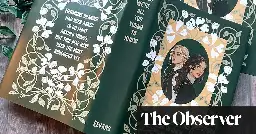
- System of a Down singer Serj Tankian's new book details band’s up and downs, and what fuels his activismwww.latimes.com System of a Down singer Serj Tankian's new book details band’s up and downs, and what fuels his activism
Before releasing new memoir "Down With the System" on May 14, Tankian spoke about why he’s optimistic about Armenia, and whether we might see another album from System of a Down.

- Let’s talk GameLit/LitRPG…
My first experience was the Ready Player duology by Ernest Cline and the This Trilogy is Broken 4 book series by JP Valentine. I’ve also had many recommendations for Dungeon Crawler Carl by Matt Dinniman.
The Ready Player series was basically an ok story with a “hey, remember this thing from the 80’s‽” through-line. And while some of the jokes felt forced, the Valentine Series overall was a ton of fun and I couldn’t stop reading it.
What else have you really enjoyed? (This genre lends itself towards a couple of Bingo squares too. )
- What book(s) are you currently reading or listening? May 6
Bought couple of books for my young one, and just read through them.
- Read Race to the Rescue By Zanib Mian, book 2 of her "Meet the Maliks - Twin Detective". It's kinda like The Wimpy Kid, but about twin Muslim kids and their family.
- Read The Stonekeeper by Kazu Kibuishi. Book 1 of Amulet series. A 9 book series of graphic novels for kids.
What about all of you? What have you been reading or listening lately?
And how many of you are taking part in our Books Bingo? Any progress yet?
- Can anyone name the John Grisham book about a large trial with someone trying to tamper with the jury?
I think it's a tobacco trial. The main character is the wife of one of the jurors? I think the bad guy / big company is trying to buy the jurors out by using the services of the wife
- Progress Report April '24 - Joe Abercrombiejoeabercrombie.com Progress Report April '24 - Joe Abercrombie
Last time I announced that The Devils was basically finished, this time I’ll announce that it’s even more basically finished, the copy edit having been done and sent back. US and UK cover art is now pretty much finalised, more about that when it’s appropriate, and we’re currently working on some exc...
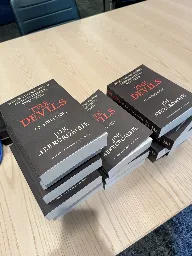
- 2024 Bingo Recommendations List
Have you really enjoyed reading a work that qualifies and want to recommend it to others? This is the prime spot to help people out with those recommendations.
The way this thread works is that this thread will contain one top level comment for each Bingo square. In order to preserve the organization and readability of this post, please limit recommendations to only replies on those top-level comments. We will be removing comments that don't follow this rule for for this specific post.
| | A | B | C | D | E | |:---:|:---:|:---:|:---:|:---:|:---:| | 1 | Older Than You Are | Water, Water Everywhere | What’s Yours is Mine | Family Drama | It Takes Two | | 2 | New Release | Plays With Words | Independent Author | Bookception | Disability Representation | | 3 | Eazy, Breazy, Read-zie | Stranger in a Strange Land | One Less | There is Another... | LGBTQIA+ Lead | | 4 | Now a Major Motion Picture | It’s About Time | Award Winner | Mashup | Local to You | | 5 | Debut Work | It’s a Holiday | Institutional | Minority Author | Among the Stars | | | | | | | | | Alt. | Same Author, New Work | She Blinded Me With Science | Pseudonymous Work | Translated | A Change in Perspective |
You can scroll through the thread or use the links above if your reader supports comment linking directly.
Reminder, Please DO NOT make comments that are not replies to a prepopulated top-level comment. Your comment will just be removed without any additional info.
- Welcome to the Inaugural books@lemmy.world Bingo for 2024!
Want to read more, but need motivation or direction? Want to gamify or expand your reading? Try book bingo! Our hope with this challenge is to provide a fun way for you to keep up with your reading goals throughout the next 12 months.
How does it work?
The goal is to read something that fits the theme for each bingo square in any single row, column, or corner diagonal of your choice (one work per theme/square). If you would like to, you’re welcome to complete the entire card (or multiple cards). But to clarify, normal bingo rules apply, you only need 5 in a row for a bingo.
Since this is about helping you along in your reading journey, there’s no requirement to read any particular kind of work. Prefer a different format, like graphic novels or audio books? Go for it. Want to read in a different language? Cool. Only have time or energy for single short stories. That’s fine, too. You can read fiction of any genre, nonfiction of any topic, books of poetry, or whatever else interests you, as long as it works for the square. We wanted this to be as open and flexible as possible, to be welcoming to as many people as possible.
We hope you’ll participate in the community throughout the year by sharing how you’re doing with bingo, helping others with suggestions, and posting your feelings about what you’re reading in dedicated threads or the weekly "What are you reading?" thread.
In mid-April, 2025, we'll put up a turn-in post to collect what everyone's been reading; we'll be using that thread to put together a summary, once the bingo period ends. Additionally, if there's a way to provide community flair or some other recognition to participants, that's how we'll determine eligibility. So, if you want to be counted and/or recognized, please make sure to contribute to that post, even if you've made other bingo posts or comments during the year!
Rules
- You must read a different work for every square you complete, even across multiple cards. There is no conflict, however, with overlapping other reading challenges that aren't associated with c/Books.
- Repeating authors on the same card isn’t forbidden (especially for the “There Is Another…” and “Same Author, New Work” squares), but we encourage you to read as new to you or different authors for every square on a card.
- Likewise, we encourage you to primarily read things you haven’t read before.
- If you’re having trouble filling a certain square, we’ve provided a few alternates you can substitute in (see below). Please limit your substitutions to one per card.
- The 2024 Bingo period lasts May 1st, 2024 – April 30th, 2025. Anything you finish during that time period is eligible, as long as you were no more than halfway through on May 1st.
Upping the Difficulty
Want an additional challenge? Try one of these, or come up with a variation of your own (and share them!).
- Hard Mode: Each square description includes an optional extra restriction to the theme, which you can do or ignore on a square-by-square basis. It's up to you!
- Genre Mode: Read only one genre.
- Review Mode: Write a review (ratings alone don’t count) for the books you read for bingo, either here on c/Books, a personal blog, Bookwyrm, The Storygraph, Hardcover.app, or elsewhere.
The Card
The Squares
Row 1
- 1A - Older Than You Are: Published before your birthdate. HARD MODE: Published before 1924.
- 1B - Water, Water Everywhere: The title refers to some form or body of water. HARD MODE: Not liquid water.
- 1C - What’s Yours Is Mine: Theft, piracy, fraud, or espionage is a major topic or plot point. HARD MODE: No MacGuffins.
- 1D - Family Drama: Family is important, but sometimes it's also the cause of problems. Family dynamics are fundamental to the narrative. HARD MODE: Involves three or more generations of family members.
- 1E - It Takes Two: Written by two or more authors. HARD MODE: Written by three or more authors.
Row 2
- 2A - New Release: New for 2024/2025 (no reprints or new editions). First translations into your language of choice are allowed. HARD MODE: This is the first work you've read by this author.
- 2B - Plays With Words: Written in a stylistically unconventional way. HARD MODE: Fits the definition of Experimental Literature.
- 2C - Independent Author: Self-published by the author. Works later published though a conventional publishing house don't count unless you are reading it before the switch, and it's republished before April 30th, 2025. HARD MODE: Not published via Amazon Kindle Direct.
- 2D - Bookception: Features a book-related aspect. HARD MODE: Something other than a book, like an author or library.
- 2E - Disability Representation: A main character has or gains a disability to which they must adapt. This disability must be grounded in reality: if a 4,000 year old Prince of the Shokan lost an arm, that would count; if he became a werewolf, it would not. HARD MODE: The piece is at least partially from their perspective.
Row 3
- 3A - Eazy, Breazy, Read-zie: A light, popcorn-worthy read that’s not real deep (see also “beach read” and “airport novel”). HARD MODE: You actually read it while on a vacation/staycation.
- 3B - Stranger in a Strange Land: The primary PoV is dropped into a completely unfamiliar situation or location. HARD MODE: Not portal fiction or isekai.
- 3C - One Less: A book that’s been on your TBR list for a long time. HARD MODE: Overlaps with at least one other bingo square theme.
- 3D - There Is Another…: Not the first in a series. HARD MODE: Series has 5 or more entries.
- 3E - LGBTQIA+ Lead: A main character identifies as LGBTQIA+. HARD MODE: Includes a significant romance between characters that identify as LGBTQIA+.
Row 4
- 4A - Now a Major Motion Picture: The work has been adapted into a show or single episode, movie, play, audio drama, or other format. HARD MODE: The adaptation is regarded as better than the original work.
- 4B - It’s About Time: The passage or manipulation of time is a major theme or plot driver. HARD MODE: Backward in time, not forward.
- 4C - Award Winner: Has won a significant literature award. HARD MODE: More than one award.
- 4D - Mashup: A combination of two or more genres or non-fiction topics. HARD MODE: Unusual combo, like fantasy thriller.
- 4E - Local to You: The author lives in or writes about a location local to you (city, state, province, territory, etc.). HARD MODE: The author has spent a significant amount of time there, but wasn't born there.
Row 5
- 5A - Debut Work: An author’s first work. HARD MODE: The author is widely regarded as having a profound impact on the genre/topic.
- 5B - It's a Holiday: Takes place during a specific holiday, which is significant to the plot. HARD MODE: Not Christmas, a fictional variation of Christmas, or other winter festival.
- 5C - Institutional: Set at a non-commercial institution or facility, like a school, science lab, or prison. HARD MODE: Not a school.
- 5D - Minority Author: Minority or LGBTQIA+ author. A minority can be any member of a generally underrepresented population where you live. HARD MODE: Minority and LGBTQIA+.
- 5E - Among the Stars: Features space, astronomy, or stardom. HARD MODE: The title references the theme, too.
Alternates
These are available as swaps if one of the categories is difficult for your chosen genre, or if it fits better with your reading preferences. There is no obligation to do these otherwise.
- Same Author, New Work: An author you’ve read before, but a series (or standalone) you haven’t. HARD MODE: Give an author you didn’t like a second chance.
- She Blinded Me With Science: The author has a background and degree in a hard science. HARD MODE: More than one post graduate degree.
- Pseudonymous Work: Published under a pen name. HARD MODE: The author generally never writes under their own name.
- Translated: Not originally in your native tongue. HARD MODE: Has been translated into at least ten other languages. This Wikipedia page is a good place to start for widely translated works.
- A Change in Perspective: Written in third-person perspective. HARD MODE: Second-person perspective.
Resources
If you make or find any bingo-related resources, ping or DM me so I can add them here. Thanks!
- 2024 Bingo Recommendations List
- The Storygraph Reading Challenge - You don’t need to use The Storygraph or any other reading tracker to do this challenge, this is just an additional support tool for those interested.
Appreciation
- This challenge is inspired by, but totally separate from, the one run by r/Fantasy on Reddit. We deeply appreciate the past organizers and the work they did that we are now benefitting from.
- Thank you for so much to misericordiae for the design and production of the card.
- 2024 bingo card font credits: Bungee Shade, by David Jonathan Ross; Roboto Condensed, by Christian Robertson.
- Paul Auster died yesterday at the age of 77
His notable works include The New York Trilogy (1987), Moon Palace (1989), The Music of Chance (1990), The Book of Illusions (2002), The Brooklyn Follies (2005), Invisible (2009), Sunset Park (2010), Winter Journal (2012), and 4 3 2 1 (2017). His books have been translated into more than forty languages.
- What book(s) are you currently listening to or reading - April 29
Hi all, I’m taking over the weekly c/Books post this week to talk about what’s happening on the First of May.
But first things first, my update…
I’m finishing up Illumination by T. Kingfisher. I only found her within the last 2 years, but I’m loving all of her stuff.
On to Bingo. In 2 days, in the morning (US Central Time because that’s where I live), I’ll put up a post with details for Bingo. Our hope is to provide a some additional motivation or even gamification of reading over the next year. There are 25 categories that we’ve tried to craft to be flexible no matter what your chosen genre or category are. We’ll additionally have a post where you can find or post recommendations for each category. And throughout the year we’ll post check-ins for those who are participating.
Dresden, Misericordiae, and I are excited and hope you’ll join us.
- TIL what a fix-up novel is
> A fix-up (or fixup) is a novel created from several short fiction stories that may or may not have been initially related or previously published. The stories may be edited for consistency, and sometimes new connecting material, such as a frame story or other interstitial narration, is written for the new work.
I'd just never heard the term before this article popped up last night. Thought maybe it might be a new thing for some of you, as well!
- Alex Verus in Germany – End of the Series | Benedict Jacka
Whole series is fully translated to German.
- French national library quarantines books believed to be laced with arsenicwww.theguardian.com French national library quarantines books believed to be laced with arsenic
Chemical thought to be in emerald green covers of four 19th-century books identified by Poison Book Project
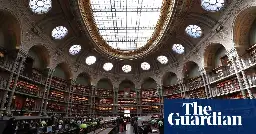
- Do you have a soundtrack when you read?
Back in the mid 90’s Steve Perry wrote Star Wars: Shadows of the Empire and an orchestral soundtrack was published to go with it.
Since then, If I’m getting in to a book where I’m just focusing on reading (vs reading while I wait for an appointment for example) I like to try and match music with the style of book I’m reading. I have playlists where Gritty detective action gets groups like Street Cleaner, classic Fantasy gets soundtracks like this from The Elder Scrolls steampunk gets Lindsey Stirling and space operas get soundtracks from games like Halo or movies like Interstellar.
Do any of you do anything similar and if so do you mind sharing what you pair?


